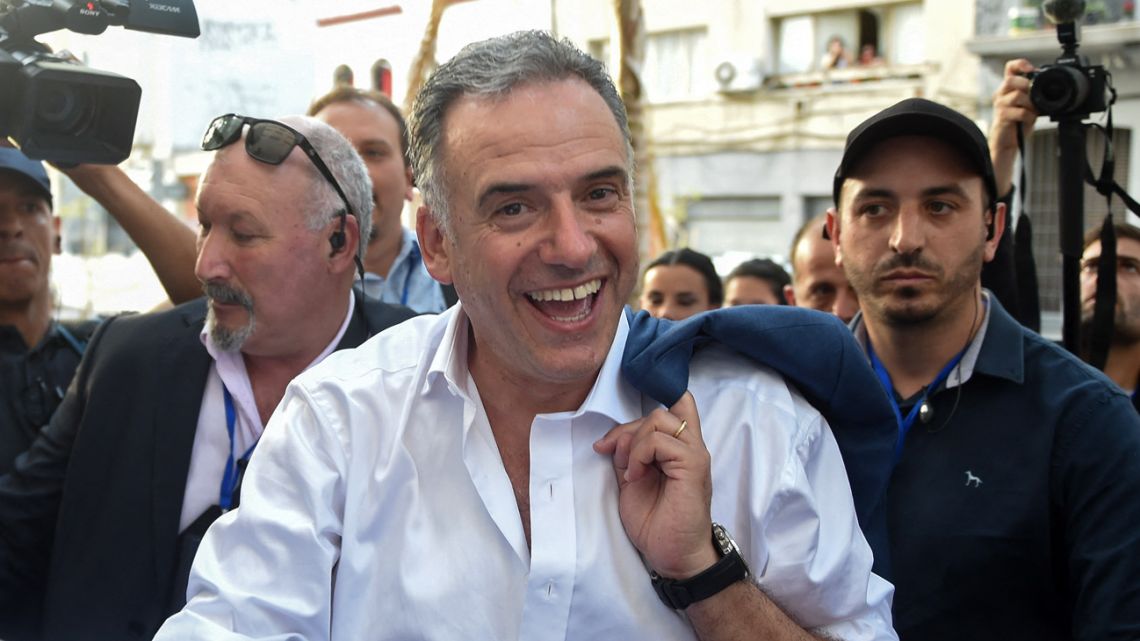Argentines are extending the duration of their peso savings and investments, signalling confidence in President Javier Milei’s ability to reduce inflation and keep the exchange rate stable.
Sentiment in Argentina is improving, with traders looking for longer maturities in fixed-rate peso bonds. Investors are also depositing their savings for longer periods of time in expectation of lower interest rates.
Holdings of 60- to 180-day certificates of deposit have tripled since July, accelerating faster than those of shorter-duration CDs, according to figures by the country’s Central Bank. The instruments doubled their share of the total in the past four months, even though they still represent less than 10 percent of banks’ total deposits, the data show.
“Savers want to lock in higher rates today because they believe they will fall along with inflation,” says Rodrigo Park, director for economic research at Banco Santander Argentina SA, one of the country’s largest private banks by assets.
Wholesale savers
The trend is largely driven by wholesale savers, a category made up of businesses that hold at least 10 million pesos (US$9,936), according to Agustín Mariani, the bank’s chief financial officer. “We decided to look for more longer-term deposits than we had been doing with remunerated accounts and guaranteed loans,” Mariani said. “There is less liquidity in the system due to strong demand for loans.”
Longer-term peso Treasury notes maturing in June and August 2025 have risen 36 percent and 41 percent in secondary trading since late August. That’s compared to a less than a 30 percent increase in prices of short-term notes during the same time period, according to Central Bank figures. The country’s Treasury in October increased the average maturity of the debt it sells at auctions to 250 days, up from 150 days in July.
“Earnings of these peso bonds were very strong and, as long as the Central Bank can keep buying dollars in the exchange market, the carry trade will be longer,” said Javier Casabal, head of research at AdCap Grupo Financiero in Buenos Aires. Peso bonds can rise another 10 percent next year, he said.
BBVA Asset Management is among the investors opting for longer duration assets. “Our funds have increased the duration of funding, in line with our view of a lower inflation environment and declining interest rates,” said Lautaro Veliz Espeche, general manager at BBVA. “We increased the exposure to certificates of deposit versus remunerated accounts and extended the duration of these instruments,” he said.
Contrary to local investors, foreigners have remained on the sidelines as they face ongoing foreign exchange controls. The lack of a new deal between the International Monetary Fund and Argentina’s government is also making foreign investors wary.
Lower borrowing costs
Argentine investors haven’t been betting on lower rates and longer-duration debt since 2017. The recent shift marks a new challenge for the country’s banks, which over the past seven years got used to allocating their capital to Central Bank debt instruments.
Banco Nación, Argentina’s largest state-owned bank, has started selling its stockpile of government bonds, said Alejandro Henke, the bank’s director and head of finance. The bank recently lowered its borrowing costs, offering peso loans to small and medium-sized businesses at a fixed interest rate for the first time in 30 years, Henke said.
Reality check
Still, there are questions whether the positive sentiment will continue. Investors are currently digesting recent earnings reports, which could lead them to take on more conservative positions, according to Adcap’s Casabal.
“When we start to look at the medium term, the risk is that bad data will be published, such as slightly higher inflation or lower purchases of dollars by the Central Bank,” he said.
Debt maturities could shorten again if investors see slower progress on inflation or if there are other signs that Milei’s economic programme is not sustainable.
“The risks are political factors,” said Diego Chameides, chief economist at Banco de Galicia, Argentina’s largest private bank by assets. Among those factors are potential volatility in foreign exchange markets, uncertainty associated with upcoming legislative elections and “a slower pace of disinflation in the face of more robust growth in activity in the coming months,” Chameides said.









